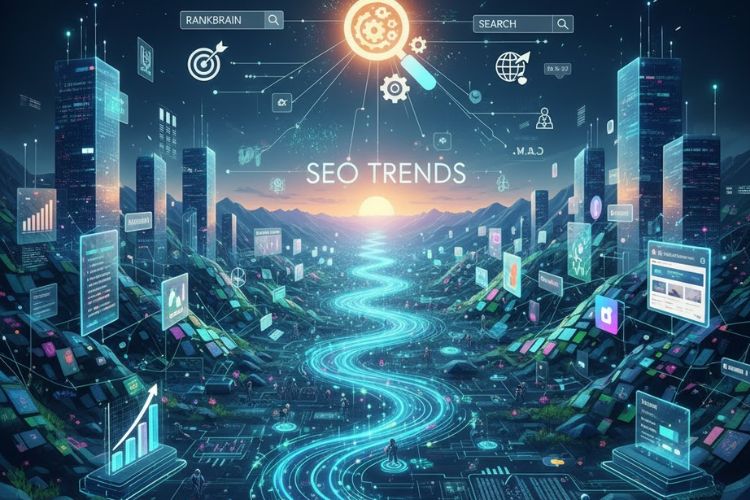Ever wondered how search engines seem to know exactly what you’re looking for? It’s not magic—it’s Machine Learning (ML) shaping the new face of SEO. From analyzing user behavior to predicting content success, ML algorithms are quietly rewriting the rulebook of search visibility. If you’re an aspiring business in the digital race, partnering with an SEO Agency in Dehradun can help you harness this power effectively.
The Connection Between Machine Learning and SEO
SEO is no longer about keyword stuffing or backlinks alone—it’s about intelligence. Machine Learning teaches search engines to “think” like users. Algorithms now evaluate user intent, dwell time, and even emotional tone to decide which page deserves the top spot. In essence, ML transforms SEO from a static checklist into a dynamic, evolving system.
Google’s RankBrain, launched in 2015, was one of the earliest examples of this transformation. It interprets complex search queries and continuously learns from user interactions. According to Search Engine Journal, RankBrain remains a major ranking factor influencing search results daily.
Key Machine Learning Algorithms Driving SEO Evolution
1. RankBrain: The Learning Engine
RankBrain helps Google understand ambiguous queries and connect them with the most relevant results. It evaluates click-through rates and user satisfaction, rewarding pages that truly meet user intent. This means businesses must now prioritize user experience as much as keyword optimization.
2. BERT: Understanding Human Language
Introduced in 2019, Google’s BERT (Bidirectional Encoder Representations from Transformers) interprets the context behind words. For instance, it can distinguish between “visa for work” and “work for visa”—a subtle difference, yet critical for relevance. Content that reads naturally and contextually now ranks higher.
3. Neural Matching and MUM: The Contextual Revolution
Neural Matching connects search terms with related ideas, while MUM (Multitask Unified Model) analyzes multiple data forms—text, images, and even video—to serve holistic results. These models make search results more personalized, intuitive, and diverse.
How Machine Learning Is Reshaping SEO Practices
Modern SEO is now data-driven, predictive, and personalized. Here’s how Machine Learning fuels that change:
- Predictive Analysis: ML forecasts keyword trends, allowing marketers to create content before demand peaks.
- Automated Optimization: ML tools like Clearscope and MarketMuse analyze top-ranking pages to suggest real-time improvements.
- User Intent Mapping: Algorithms segment audiences by intent—informational, transactional, or navigational—to match content with goals.
- Voice and Visual Search: ML enhances natural language and image recognition, a boon for voice assistants and eCommerce SEO.
With these shifts, businesses must adapt. Integrating ML insights through trusted partners offering SEO Services in India ensures you remain competitive in an ever-learning ecosystem.
Top Benefits of ML-Driven SEO
- Improved Accuracy: Data-driven optimization reduces human bias and error.
- Enhanced User Experience: Personalization ensures visitors find exactly what they need.
- Faster Decision-Making: ML tools automate reporting and performance insights.
- Scalable Growth: Continuous learning means SEO strategies improve over time.
Real-World Applications of Machine Learning in SEO
Big brands already use ML-powered SEO to maintain dominance. For instance, eCommerce giants like Amazon rely on recommendation algorithms that boost relevant product visibility. Similarly, platforms like YouTube use ML to personalize suggested videos, directly affecting engagement and retention rates (Pew Research).
FAQs
1. How does Machine Learning improve SEO rankings?
Machine Learning analyzes search behavior and content engagement to determine which pages best match user intent, leading to more accurate rankings.
2. What role does RankBrain play in SEO?
RankBrain interprets complex or unseen search queries, learning continuously to connect them with the most relevant results.
3. Is Machine Learning replacing traditional SEO?
Not entirely. It’s enhancing it. Traditional practices like content quality and backlinks still matter—but ML ensures smarter execution and deeper insights.
4. Can small businesses use ML for SEO?
Absolutely. Tools like Surfer SEO, SEMrush, and Clearscope integrate ML-driven insights that help smaller brands compete effectively in digital spaces.
Also Read >> How we Use Marketing Automation to Take Your Brand to the Next Level
Final Thoughts
Machine Learning isn’t just powering SEO—it’s redefining it. The algorithms behind Google’s evolving intelligence continue to shape how content gets discovered, consumed, and ranked. The key lies in staying adaptable—because in the new world of search, the smartest optimizer wins.
Blog Development Credits:
This article was ideated by Amlan Maiti, crafted through advanced tools like ChatGPT, Google Gemini, and Copilot, and refined by Digital Piloto PVT Ltd.



